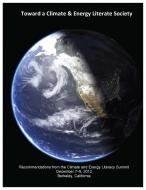 Experts from around the nation meet to tackle climate literacy
Experts from around the nation meet to tackle climate literacy
"We have lots of information about climate change, but much of it is falling on deaf ears," says Mark McCaffrey, NCSE policy director. "That's because 90% of Americans admit they're not very well informed about climate change, but 75% would like to know more."
"It's a scandal," adds NCSE's executive director, Dr. Genie Scott. "Climate change is the major challenge of the 21st century. But the current generation of K-12 and college students—76 million Americans—aren't equipped to make informed decisions about climate change—decisions that could literally affect the fate of our planet in their lifetimes."
That's why the National Center for Science Education decided to act. To counter the rise in climate cluelessness, NCSE recently gathered 50 climate and energy leaders for a three-day summit held in Berkeley, CA. The meeting included atmospheric scientists, environmental experts, policy mavens, master educators, and science journalists, from the National Academy of Sciences (NAS), the American Geophysical Union, the Alliance for Climate Education, NOAA, the United States Global Change Research Program, Stanford University, Columbia University, the University of California Museum of Paleontology, National Geographic Society, the Ecological Society of America, and dozens of other organizations.
The ultimate goal of the summit: to substantially improve climate and energy literacy in the U.S. in the next ten years.
"It's easier said than done" notes Dr. Minda Berbeco, biologist and NCSE policy director. "The challenges are considerable in terms of coordination, training, and funding. You have a variety of agencies and organizations, from the NAS to the Chicago Zoological Society, with different audiences, different agendas, and different approaches to education. Federal funding has dried up and private foundations have not stepped up to fill the gap."
The Summit's conclusions?
* Students and adults don't know much about the climate or energy—but they want to learn more
* Deliberate efforts to foster doubt and denial have contributed to lack of climate change education
* Teachers and informal educators must become climate and energy literate
The Summit's recommendations?
* Conduct a nationwide survey of educators to determine if, where, and how climate change is being taught in schools
* Determine which programs and practices will substantially and measurably improve climate and energy literacy
* Support existing programs—and help fund new ones—that get K-16 teachers up to speed on climate and energy
* Create a national initiative that binds all the relevant players to a common agenda, goals, and methods for measuring success
* Back the Next Generation Science Standards (NGSS) and emphasize teaching climate- and energy-related topics throughout the curriculum
* Anticipate and effectively respond to science denial and manufactured doubt about climate change
As climatologist (and NCSE board member) Ben Santer recently put it, "Our kids need to be savvy about the science of climate change, so they can make smarter decisions than we've made, do a better job managing emissions of greenhouse gases, and prepare for changes already well underway."
Links:
Summit report: "Toward a Climate & Energy Literate Society"
CONTACT: Robert Luhn, Director of Communications, NCSE, 510-601-7203, luhn@ncse.com
Web site: www.ncse.com/climate
The National Center for Science Education (NCSE) is a not-for-profit membership organization that defends the teaching of evolution and climate science in the public schools. The NCSE provides information, resources, and advice to schools, teachers, parents, and concerned citizens defending science education. We educate the press and public about the scientific, educational, and legal aspects of these issues at local, state, and national levels. Our 4500 members are scientists, teachers, clergy, and citizens with diverse religious and political affiliations. www.ncse.com
